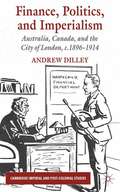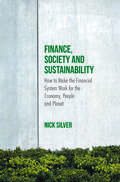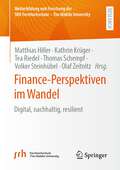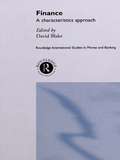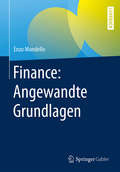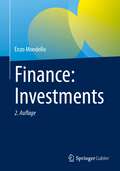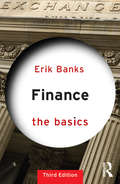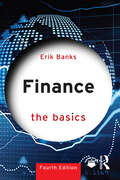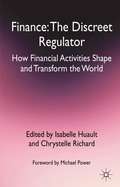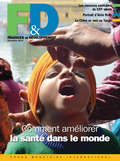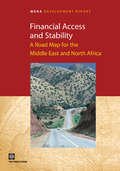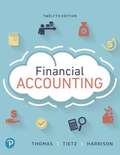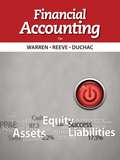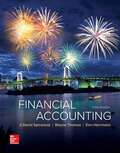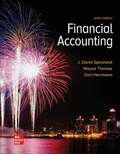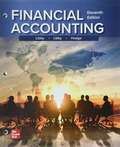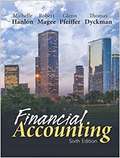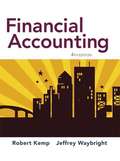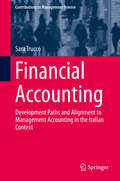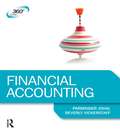- Table View
- List View
Finance, Politics, and Imperialism
by Andrew DilleyAndrew Dilley offers a major new study of financial dependence, examining the connections this dependence forged between the City and political life in Edwardian Australia and Canada, mediated by ideas of political economy. In doing so he reconstructs the occasionally imperialistic politic of finance which pervaded the British World at this time.
Finance, Society and Sustainability: How to Make the Financial System Work for the Economy, People and Planet
by Nick SilverThis book is a critical analysis of the impact of the financial system on the economy, society and the natural environment. It cuts through the noise to looks at its purpose, its activities, and what it does in practice.Unlike other books that cover the last financial crisis and the risk of another one; this book is about the consequence of the financial system continuing in its current form. It argues that the financial system is a construct of flawed economic theories, designed in the hope that the market will efficiently allocate society’s capital. Instead, the finance sector allocates savings and investment to maximize its own revenues, with resulting collateral damage to the economy, society and the environment.Although governments try to preserve and regulate the existing system, it is being replaced by a new system driven by technological innovation. The book describes the opportunities this presents for a renaissance of the financial system to actually meet the needs of society, and to re-engineer our economy to avoid environmental crisis.The book is for anyone who would like to understand the finance system’s purpose, what it does in practice and its impact on the real world. For those working in the industry it provides an overview of the system, their place within it, and how to bring about change. For students and academics it provides a valuable critique of the financial system, and the theories on which it is based. For financial policymakers and regulators it identifies key challenges in their activities.
Finance-Perspektiven im Wandel: Digital, nachhaltig, resilient (Weiterbildung und Forschung der SRH Fernhochschule – The Mobile University)
by Volker Steinhübel Matthias Hiller Kathrin Krüger Tea Riedel Thomas Schempf Olaf ZeitnitzDer Sammelband stellt aktuelle Entwicklungen in Wissenschaft und Praxis – immer aus dem Blickwinkel des Finanz- und Rechnungswesens und des Controllings - umfassend und gleichzeitig fokussiert dar. Dabei werden Aspekte insbesondere zur Realisierung einer digitalen, nachhaltigen und resilienten Unternehmung aufgezeigt. In den Beiträgen werden verschiedene Themen aufgegriffen, u. a. Entwicklungen und Perspektiven im Steuerrecht sowie der Wandel des Finance-Bereichs durch Nachhaltigkeit, Innovationen und Technologien.
Finance: A Characteristics Approach (Routledge International Studies in Money and Banking #Vol. 7)
by David BlakeSince the 1980s, the characteristics model in economics has been applied to the field of finance, and offers a fresh perspective for understanding financial behaviour. This book brings together some of the latest research by leading exponents of the characteristics model and its application to finance.
Finance: Angewandte Grundlagen
by Enzo MondelloDieses Buch gibt Studierenden von Fachhochschulen und Universitäten sowie Teilnehmern von Weiterbildungslehrgängen einen umfassenden und gut verständlichen Einstieg in die finanzmarkttheoretischen Konzepte der Kapitalanlage. Dazu gehören die Grundlagen des Portfoliomanagements, die wichtigsten Anlageinstrumente sowie die Verfahren zu ihrer Analyse und Bewertung. Jedes Kapitel besteht aus einer Einleitung, dem eigentlichen Lehrinhalt, einer Zusammenfassung, Aufgaben und Lösungen, Microsoft-Excel-Applikationen und dem Literaturverzeichnis. Das Buch ist praxisorientiert, da zum einen die im Buch aufgeführten Aufgaben vorwiegend reale Beispiele enthalten und zum anderen am Ende der Kapitel die Microsoft-Excel-Applikationen aufgeführt sind, welche die Umsetzung der im Kapitel vorgestellten Finance-Konzepte ermöglichen.
Finance: Investments
by Enzo MondelloDieses Buch gibt Studierenden von Fachhochschulen und Universitäten sowie Teilnehmern von Weiterbildungslehrgängen einen umfassenden und gut verständlichen Einstieg in die finanzmarkttheoretischen Konzepte der Kapitalanlage. Dazu gehören die Grundlagen des Portfoliomanagements, die wichtigsten Anlageinstrumente sowie die Verfahren zu ihrer Analyse und Bewertung. Jedes Kapitel besteht aus einer Einleitung, dem eigentlichen Lehrinhalt, einer Zusammenfassung, Aufgaben und Lösungen, Microsoft-Excel-Applikationen und dem Literaturverzeichnis. Das Buch ist praxisorientiert, da zum einen die im Buch aufgeführten Aufgaben vorwiegend reale Beispiele enthalten und zum anderen am Ende der Kapitel die Microsoft-Excel-Applikationen aufgeführt sind, welche die Umsetzung der im Kapitel vorgestellten Finance-Konzepte ermöglichen.
Finance: The Basics (The Basics)
by Erik BanksNow in its third edition, Finance: The Basics is a clear and practical introduction to the world of finance. It thoroughly explains essential financial statements, tools and concepts; fundamental financial instruments and transactions; and global financial participants, markets and systems. This fully revised third edition captures the most important aspects of a changing financial landscape, including: • Updates on key areas of the financial system, including default experience, corporate finance trends, growth in dark pools, hedge funds, foreign exchange and derivatives, and changes to the international regulatory and central banking framework. • Further real-world examples/studies that introduce, or expand upon, a range of practical topics; 12 updated studies are supplemented by new cases related to reinsurance, central bank quantitative easing and digital currency and payments. • A comprehensive glossary containing key terms discussed in the book. Each chapter is accompanied by an overview and summary, illustrations and tables, real life case studies, and recommended readings. Finance: The Basics is essential reading for anyone interested in the fascinating world of finance.
Finance: The Basics (The Basics)
by Erik BanksNow in its fourth edition, Finance: The Basics is a clear and practical introduction to the world of finance. It thoroughly explains essential financial statements, tools, and concepts; fundamental financial instruments and transactions; and global financial participants, markets, and systems. This fully revised edition captures the most important aspects of a changing financial landscape, including: • A new chapter dedicated to the emerging world of digital currencies, with a review of digital finance and a detailed discussion of regulated and unregulated digital currencies (including cryptocurrencies). • New sections dealing with a range of social issues that directly impact on finance, including sustainability; environmental, social, and governance (ESG) and socially responsible investing (SRI) imperatives; microfinance; and impact investing. • Twelve updated real-world case studies ('Finance in Action' studies) and nine new case studies focused on annuities, sustainability, green financings, microfinance, digital currencies, financial technology/decentralised finance, ESG and SRI investing, quantitative easing and tightening, and the financial emergence of China. • A concise and comprehensive glossary containing key terms discussed in the book. • Supplemental digital resources, including PowerPoints for instructors and a test bank of questions for students. Each chapter is accompanied by an overview and summary, illustrations and tables, real-life case studies, and recommended readings. Finance: The Basics is essential reading for anyone interested in the fascinating world of finance.
Finance: The Discreet Regulator
by Isabelle Huault Chrystelle RichardThe global financial crisis that began in the summer of 2007 has brought the financial industry to centre stage. While most current analysis focuses on the way finance can be regulated in the topical context of the economic crisis, this book aims to show how financial activities actually shape and transform the world. Highlighting that the true regulators of the economy are not only regulatory state authorities, the book demonstrates that the financial sphere really does contribute to rule-setting. It argues that actors that seem to be the objects of regulation or intervene only at its fringe are in fact 'discreet regulators' which provide the institutional framework that fosters the creation and globalization of markets. Building on a series of case studies, Finance: The Discreet Regulator highlights how public authorities and private actors jointly regulate the real world, with joint regulation being dominated by a multiplicity of financial actors, and looks at a variety of key players, who take part in the very heart of the regulatory process.
Finances & Développement
by Fonds monétaire internationalA report from the International Monetary Fund.
Finances & Développement
by International Monetary FundA report from the International Monetary Fund.
Financial Access and Stability
by The World BankThe countries of the Middle East and North Africa (MENA) have been recovering from the global financial crisis, but the recent political turmoil has interrupted the pace of credit and output recovery in many countries. The political turmoil in the MENA region reveals deep-seated frustrations and a sense of political, social, and economic exclusion, especially among the youth. The relatively weak growth performance reflects a combination of insufficient reforms and weak reform implementation, including financial sector reforms. The structural weaknesses of financial sectors imply that access to finance may remain restricted even with a full recovery of credit activity. Therefore, the region's countries face an ambitious reform agenda to revert two decades of relatively poor performance of output and employment growth. Financial development should be a central component of the region's growth agenda. This study reviews the region's financial systems, the severity of the limitations on access to finance, and the main factors behind such limitations. It goes on to provide a road map for expanding access and preserving financial stability.
Financial Accounting
by Joe Ben Hoyle C. J. SkenderThis book is suitable for an undergraduate or MBA level Financial Accounting course. If authorship matters (and we believe it is everything) then this book is destined to be a classic. There are no two better authors than these. Joe Ben Hoyle is co-author of two current market-leading advanced accounting textbooks with McGraw-Hill. He and and co-author CJ Skender are nationally recognized as master teachers. Both have won numerous teaching awards, and both were recently recognized by BusinessWeek as top undergraduate professors. The authors bring their collective teaching wisdom to bear in this book not by changing "the message"(financial accounting content), but by changing "the messenger" (the way the content is presented). The approach centers around utilizing the Socratic method, or simply put, asking and answering questions. The reason that this approach continues to be glorified after thousands of years is simple - it engages students and stresses understanding over memorization. So this text covers standard topics in a standard sequence, but does so through asking a carefully constructed series of questions along with their individual answers.
Financial Accounting
by Charles Horngren Walter Harrison C. Thomas Wendy TietzAccounting is the language of business, and understanding the role accounting plays in business is critical to a student's success in earning a business degree. Financial Accounting puts the focus on the purpose of Accounting in business. With student-friendly examples and streamlined chapters, the 12th Edition delivers a student-centric approach to learning financial accounting. Time-tested resources like the Turnkey Case Resources, help students grasp the practical concepts of accounting, so that they can put them into practice in their future business careers.
Financial Accounting
by Carl S. Warren James M. Reeves Jonathan DuchacActivate Learning with Warren/Reeve/Duchac's, FINANCIAL ACCOUNTING! Market-leading FINANCIAL ACCOUNTING has been on the forefront of innovation and change based on the needs of today's students. Warren offers you clear guidance to complete homework with an efficient presentation for today's learner. The high impact writing style and streamlined design makes important information accessible, with a focus on providing the best and most complete examples. The Complete Learning System in FINANCIAL ACCOUNTING and CengageNOW is built around the way you use textbooks and online resources to learn, study and complete homework, allowing you to achieve ultimate success in this course. The end goal of Warren/Reeve/Duchac's text and technology learning system is to Activate Learning & making you a more active participant in the learning process and making you better prepared--ready to take on the rest of your educational and career goals.
Financial Accounting
by Wayne Thomas Don Herrmann David SpicelandDon’t you love those moments in your course when students are fully engaged? When the “Aha!” revelations are bursting like fireworks? David Spiceland, Wayne Thomas, and Don Herrmann have developed a unique set of materials based directly on their collective years in the classroom. They’ve brought together best practices like highlighting Common Mistakes, offering frequent Let’s Review exercises, integrating the course with a running Continuing Problem, demonstrating the relevance of the course with real-world companies and decision analysis, and conveying it all in a student-friendly conversational writing style. The authors have developed a concise and well-organized learning framework to show students that accounting consists of three major processes: measuring, analyzing, and communicating. By consistently tying each lesson into this framework, instructors can continue to improve student outcomes. After the proven success of the first four editions of Financial Accounting, the fifth edition will continue to motivate, engage, and challenge students. Paired with the market-leading power of the Connect platform, the Spiceland/Thomas/Hermann author team will truly illuminate the financial accounting course for each student.
Financial Accounting
by Wayne Thomas Don Herrmann David SpicelandDon’t you love those moments in your course when students are fully engaged? When the “Aha!” revelations are bursting like fireworks? The authors have developed a unique set of materials based directly on their collective years in the classroom. They’ve brought together best practices by (1) building an Organized Learning Framework for Financial Accounting, (2) reinforcing the Framework in each chapter’s text and end-of-chapter assignments, and (3) enriching that Framework using real-world companies, Excel assignments, General Ledger problems, data analytics tools, and a variety of auto-graded cases. The material is communicated in a student-friendly, concise and conversational writing style. After the proven success of the first five editions of Financial Accounting, we are confident that the sixth edition will not only motivate, engage, and challenge students—it will illuminate the financial accounting course like never before.
Financial Accounting
by Robert Libby Patricia Libby Frank HodgeLibby/Libby/Hodge wrote this text based on their belief that the subject of financial accounting is inherently interesting, but financial accounting textbooks are often not. They believe that accounting is an exciting field of study and one that is important to future careers in business. When writing this text, they considered career relevance as their guide when selecting material, and the need to engage the student as their guide to style, pedagogy, and design. Financial Accounting 11e successfully implements a real-world, single focus company approach in every chapter. The companies chosen are engaging and the decision-making focus shows the relevance of financial accounting regardless of if a student has chosen to major in accounting. Libby/Libby/Hodge believes in the building-block approach to teaching transaction analysis. Most faculty agree that mastery of the accounting cycle is critical to success in financial accounting, and yet most financial texts introduce and develop transaction analysis in one chapter, bombarding a student early in the course with an overload of new concepts and terms. The authors slow down the introduction of transactions, giving students time to practice and gain mastery. This building-block approach leads to greater student success in their study of later topics in financial accounting such as adjusting entries.
Financial Accounting
by Michelle Hanlon Robert Magee Glenn Pfeiffer Thomas Dyckman[This book equips] students with the accounting techniques and insights necessary to succeed in today's business environment. It reflects our combined experience in teaching financial accounting to college students at all levels. For anyone who pursues a career in business, the ability to read, analyze, and interpret published financial reports is an essential skill. [This book] is written for future business leaders who want to understand how financial statements are prepared and how the information in published financial reports is used by investors, creditors, financial analysts, and managers.
Financial Accounting
by Robert Kemp Jeffrey WaybrightFor introductory courses in Financial Accounting. Understanding Financial Accounting as the Language of Business Once individuals see that accounting is the language of business, they are on their way to academic and professional success. Financial Accounting translates the essentials of accounting to readers so they understand why and when financially sound decisions are made in business today. The Fourth Edition uses real-world examples from Bold City Brewery and other businesses that readers encounter in their everyday lives, making the material relevant and giving readers more of those "I get it" moments.
Financial Accounting
by Sara TruccoThis book presents empirical evidence on the convergence of financial and management accounting in the Italian context. The author provides an overview of the development paths of financial accounting including its evolution, role of non-financial, forward looking and voluntary disclosures, and internal determinants such as corporate governance and business culture. The author uses the premises of agency, signalling, legitimacy and institutional theories in understanding this evolution, and includes the perspective of professional associations and academics on the topic. Based on survey data, the reader is provided with valuable insights into the Italian accounting scene.
Financial Accounting (17th Edition)
by Jan R. Williams Susan F. Haka Mark S. Bettner Joseph V. CarcelloWhile many texts characterize themselves as having either a “user” approach or a “preparer” approach, Williams’ Financial Accounting is written for faculty who want to strike a balance between these approaches. Business majors will find relevance in the “Ethics, Fraud & Corporate Governance,” “Your Turn” and “Case in Point” boxes throughout the chapters while accounting majors will receive a firm grounding in accounting basics that will prepare them for their intermediate course.
Financial Accounting (360 Degree Business)
by Parminder Johal Bev VickerstaffClear, concise, and written by experts currently lecturing in the field, Financial Accounting focuses exclusively on what you need to know for success in your course and career. Students looking for a focused introduction to financial accounting will appreciate this book. This innovative textbook includes features which will particularly appeal to international students, including: a clear introduction to accounting from its initial concepts, through recording transactions to the accurate interpretation of accounts relevant case studies that illustrate key accounting principles up-to-date terminology to prepare you for current business practice worldwide summaries, activities and review questions to help reinforce your understanding Part of the 360 Degree Business, which provides accessible yet stimulating introductions to core business studies modules, the text comes with additional support materials including interactive multiple choice questions available at www.routledge.com/cw/vickerstaff.
Financial Accounting (7th Edition)
by Charles T. Horngren Walter T. Harrison Jr.New edition of a text in which Harrison (Baylor U.) and Horngren (Stanford U.) discuss all aspects of financial accounting. The 12 chapters cover financial statements, processing information, accrual accounting, internal control and cash, plant assets, short-term investments and receivables, inventory, stockholders' equity, using the income statement and the statement of stockholders' equity, current and long-term liabilities, long-term investments and international, and the statement of cash flows. New features include short exercises to open the assignment material for each chapter, and Excel application problems. Annotation c. Book News, Inc., Portland, OR (booknews.com)
Financial Accounting (8th edition)
by Marian Powers Belverd E. Needles Jr.The stated goal of this textbook is to teach students, and others (such as managers) how to do financial accounting. It assumes no accounting background.
